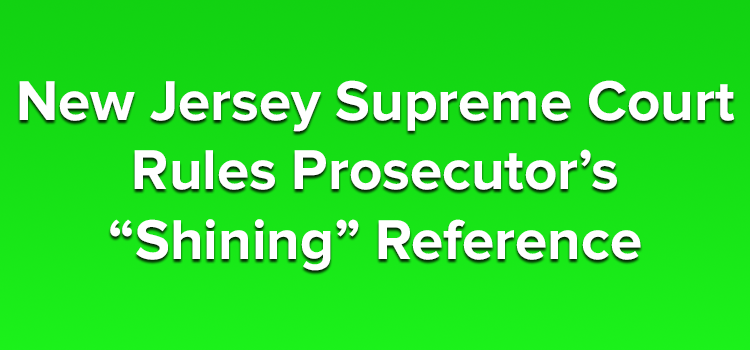
In State v. Damon Williams (A-46-19/083532) (Decided January 19, 2021), the Supreme Court of New Jersey held that the prosecutor’s comments and use of a PowerPoint slide referencing the movie The Shining amounted to prejudicial error.
Facts of State v. Williams
Defendant Damon Williams (Williams or Defendant) was charged with robbing a bank. In the course of the alleged robbery, he did not display a weapon or make a verbal threat. Instead, he passed a note to a young female teller which said, “Please, all the money, 100, 50, 20, 10. Thank you.” The central issue at trial was whether the Defendant committed second-degree robbery — theft using force or the threat of force — or third-degree theft — exercising unlawful control over the movable property of another. The jury convicted the Defendant of robbery.
Williams argued that the prosecutor’s use of a PowerPoint slide during summation denied him a fair trial. The prosecutor showed the jury a PowerPoint presentation in her closing that contained a still photograph from the movie The Shining and commented, “if you have ever seen the movie The Shining, you know how his face gets through that door.” The PowerPoint slide depicted Jack Nicholson in his role as a violent psychopath who used an ax to break through a door while attempting to kill his family. The photograph contained the words spoken by Nicholson in the movie scene as he stuck his head through the broken door — “Here’s Johnny!” The slide also bore the heading “ACTIONS SPEAK LOUDER THAN WORDS,” a theme used by the State throughout the trial to suggest to the jury that the Defendant’s conduct in the moments leading up to and following his passing the note to the teller supported a finding of robbery when viewed in context. The photograph was not previously shown to the court or defense counsel and had not been used at trial or offered or admitted into evidence.
After the prosecutor concluded her summation, defense counsel objected to the photo’s use. During a colloquy, the trial judge offered a curative instruction, but stated, “If I do that though, I’m underscoring again, the prosecution’s arguments.” Defense counsel ultimately agreed that “it may be best left alone.” Thus, the court did not give a curative instruction. The jury convicted defendant of second-degree robbery. The Appellate Division affirmed the conviction.
NJ Supreme Court’s Decision in State v. Williams
The New Jersey Supreme Court held that the prosecutor’s comments and use of the PowerPoint slide amounted to prejudicial error. Accordingly, it reversed the judgment of the Appellate Division, vacated the Defendant’s conviction, and remanded for a new trial.
In reaching its decision, the New Jersey Supreme Court emphasized that while prosecutors are expected to make vigorous and forceful closing arguments to juries, their comments should be reasonably related to the scope of the evidence presented. Moreover, references to matters extraneous to the evidence may constitute prosecutorial misconduct. In this case, the court agreed with the Defendant that the prosecutor crossed the line. “The prosecutor here, in an attempt to establish that [the teller] feared for her wellbeing because of defendant’s conduct, went far beyond the evidence at trial to draw a parallel between defendant’s conduct and that of a horror-movie villain,” the court wrote.
The New Jersey Supreme Court next turned to whether the prosecutorial misconduct was so egregious as to deprive the Defendant of a fair trial. As the court noted, factors to be considered in making that decision include: “(1) whether defense counsel made timely and proper objections to the improper remarks; (2) whether the remarks were withdrawn promptly; and (3) whether the court ordered the remarks stricken from the record and instructed the jury to disregard them.”
Taking these factors into account, the New Jersey Supreme court ultimately found that the prosecutor’s comments and the extra-evidentiary movie photo made it more likely that the jury would reject the defense that only a theft occurred. Accordingly, the prosecutor’s conduct during summation was clearly capable of having an unfair impact on the jury’s deliberations, intruded upon the Defendant’s right to a fair trial, and constituted reversible error.
The New Jersey Supreme Court declined the Defendant’s request to adopt a rule requiring prosecutors to provide opposing counsel with any planned PowerPoint presentations before openings and summations. However, it did encourage counsel to disclose to each other and the court any visual aids intended to be used during closing arguments and remind prosecutors that they must ensure their strategy and commentary fall within “the boundaries of permissibly forceful advocacy.” As the court further explained:
Prosecutors must walk a fine line when making comparisons, whether implicit or explicit, between a defendant and an individual whom the jury associates with violence or guilt. The use of a sensational and provocative image in service of such a comparison, even when purportedly metaphorical, heightens the risk of an improper prejudicial effect on the jury. Such a risk was borne out here.
